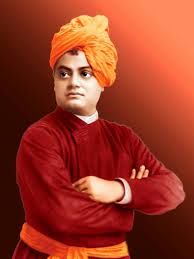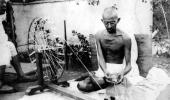 In his approach to national problems and issues Vivekananda was perhaps the first one to call for a national struggle against the challenges of material existence. While recognising the need for re-discovering and rekindling the spiritual aim of existence, the Swami did not neglect to recognise the demands of the other existence as well, says Dr Anirban Ganguly.
In his approach to national problems and issues Vivekananda was perhaps the first one to call for a national struggle against the challenges of material existence. While recognising the need for re-discovering and rekindling the spiritual aim of existence, the Swami did not neglect to recognise the demands of the other existence as well, says Dr Anirban Ganguly.
January 12 marked the culmination of Swami Vivekananda’s 150th birth anniversary. Displaying one of his usual sparks of eloquence the Swami had once remarked, giving away the deep sense of mission that he had and which he embodied for India and the world that he had given enough for the next 1,500 years.
Of those 1,500 years we have crossed 150. It is but a drop or a step in the march of civilisations. In many ways Swami Vivekananda’s impact, work and vision remains civilisational and therefore his message and life continues to retain the power of relevance and the capacity for self-renewal.
The challenges that India faced and which the Swami rose to address and grapple with, in a sense, continue to challenge our polity and national life. One of his principal contributions was that of instilling a sense of self-worth in the national mind and psyche. At a time when the perceptions of our national life, religion and goal were being defined and determined by external forces with distinct hegemonic motives, the Swami’s clarion call at Chicago, his travels across the West and then in his own land were the first steps towards creating a credible counter-narrative and position to the reading of Indian civilisation. It had an effect of reversing the flow and to redirect it from the insider to the outsider. That external attempt to define and direct Indian nationhood and national goals appear to have achieved today newer dimensions and continues to pose a formidable challenge at various levels to our present day polity.
When the movement for a cultural, religious and educational deracination was gaining ground through abetment of the colonial framework among a leading and articulate section, the Swami’s intervention arrested that trend. When those at the forefront of formulating a culturally alienating education were certain that its growth would completely detach the Hindus from their religion Vivekananda’s forceful enunciation of the bases of Hinduism put up a formidable barrier to that nefarious design.
The agenda of evolving a culturally conscious and civilisationally rooted education which, while aspiring to evolve frameworks in consonance with the future, shall remain open to the values and principles which have emerged out of our civilisational experiences, is yet to be fulfilled.
Vivekananda in expressing his passion for formulating Indian models and methods of education was perhaps the first to recognise its need.
With a wave of reformers spewing venom on the very fundamentals of Hinduism, the prevailing mindset in eighteenth and nineteenth century India displayed a distinct hostility to the fundamentals of Hinduism. It suited the colonial rulers well to gradually disengage our national life from its anchoring religion. They saw that a people, led by a confused, directionless, deracinated and alienated elite would be more amenable to subjugation.
Vivekananda challenged that mindset and those attacks. In the words of one of his foremost interpreters, Sister Nivedita, ‘what Hinduism needed, amidst the general disintegration of the modern era, was a rock where she could lie at anchor, an authoritative utterance in which she might recognise herself’, these she found in Vivekananda and in his utterances.’
It was in reference to this watershed contribution of the Swami that one of India’s rare thinker-politician, C.Rajagopalachari, in a tribute to him, observed that it was Vivekananda who had ‘save Hinduism and saved India’ and it was because of him that we did not lose our religion and eventually gained our freedom. The struggle against such a mindset which essentially glorifies a false irreligiousity of the Indian mind and life continues to this day and Vivekananda remains one of the brightest guiding lights in that intense and dark struggle.
In his approach to national problems and issues Vivekananda was perhaps the first one to call for a national struggle against the challenges of material existence. While recognising the need for re-discovering and rekindling the spiritual aim of existence, the Swami did not neglect to recognise the demands of the other existence as well.
In this he was a revolutionary much before many. He called for recognising the pitiable state that the country was reduced to through a drain of resources and asked for evolving our own solutions through our own efforts, ‘Open your eyes and see what a piteous cry for food is rising in the land of Bharata, proverbial for its wealth...With the help of Western science set yourself to dig the earth and produce food stuffs -- not by means of mean servitude of others -- but by discovering new avenues for production, by your own exertions aided by Western science.’
One of his constant questions to the articulate young was what they were doing to remedy the state of material need in the country.
His words for the need to develop scientific research in the country inspired the legendary Jamshedji Tata who wrote to him, sometime in 1898, to take leadership of an endeavour in which called for utilising the ascetic spirit of the country for the ‘cultivation of sciences -- natural and humanistic.’ The thought that India should achieve self-reliance at all levels was one of the keynotes of the Swami’s thoughts, it was a thought which ceaselessly occupied his mind and spirit and which manifested itself through his words and actions. It was such a constant pre-occupation which must have made him exhort, in 1897, to ‘abjure all deities except the Motherland for the next 50 years.’
In her perceptive summing up of Vivekananda’s work, Nivedita had movingly observed that the three keynotes that mingle to form the ‘music of the works of Vivekananda’ are the ‘Shâstras, the Guru, the Motherland...the three lights burning within that single lamp which India by his hand lighted and set up, for the guidance of her own children and of the world.’
To keep burning those three lights within that one lamp remains perhaps the greatest challenge before us today. Vivekananda’s life and the celebratory milestones in it is a constant reminder of that.
Dr Anirban Ganguly is director, Dr Syama Prasad Mookerjee Research Foundation, New Delhi.











 © 2025
© 2025